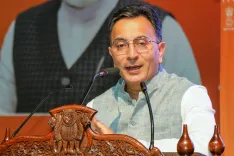Is ‘Make in India’ Crucial for Defence Self-Reliance and Nation-Building?

Synopsis
Key Takeaways
- 'Make in India' is essential for achieving defence self-sufficiency.
- Self-reliance in energetic materials is crucial for national security.
- Collaboration between government and industry is key to addressing challenges.
- Prioritizing loitering munitions can enhance military capabilities.
- The evolution of warfare demands a shift towards precision-driven systems.
New Delhi, July 30 (NationPress) Emphasizing that 'Make in India' presents a significant opportunity for the nation to achieve self-sufficiency in critical defence manufacturing, Ashok Wadhawan, the Joint President and Head of Land Systems at Adani Defence, remarked on Wednesday that in the prevailing geopolitical climate, particularly concerning energetic materials, self-reliance is essential for safeguarding India's security.
“Given the current geopolitical landscape, particularly in the realm of energetic materials, a lack of self-sufficiency could jeopardize our ability to defend our nation. This is a pivotal aspect of nation-building for us,” he conveyed to IANS during the kickoff session of PHDCCI’s Ammo Power Conference.
He elaborated that the conference is uniting the government, armed forces, private sector, and public enterprises to tackle existing challenges and foster a sustainable domestic industry for arms, explosives, and energetic materials.
“It’s an excellent event, greatly needed. We are currently in a position where we must enhance our capabilities within India, which is precisely what we at Adani are committed to,” Wadhawan stated.
Pointing out the evolving nature of warfare, Wadhawan observed that over the past 5–6 years, global conflicts have transitioned from conventional tanks and missiles to precision-based systems.
He underscored the urgency for India to develop private sector capabilities, backed by public institutions, to keep pace with this transformation.
Loitering munitions and energetic materials, he indicated, should be prioritized, with policy reforms fostering their advancement.
“We are stepping in to facilitate this transition. This is an area where the demand exists, and we are taking proactive measures to establish the necessary capabilities,” he informed IANS.
Welcoming attendees, Dr. Nasir Jamal, Director of PHDCCI, stated that ammunition is not merely a consumable but a crucial factor for mission success, deterrence, and readiness.
He emphasized that in the era of modern warfare, India's munitions must be smart, precise, reliable, and produced domestically.
Chief Guest Sanjeev Kumar, Secretary (Defence Production) at the Ministry of Defence, highlighted the government's long-term commitment to self-reliance.
He remarked that while both the government and armed forces have the intention, the industry must concentrate on the entire value chain to fulfill not only India’s requirements but also to address global demand.








